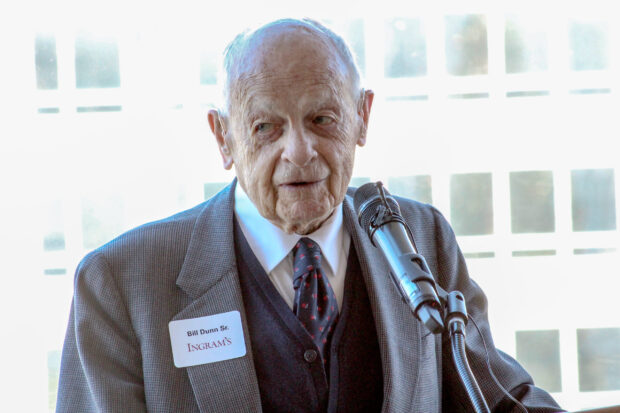HOME | ABOUT US | MEDIA KIT | CONTACT US | INQUIRE
HOME | ABOUT US | MEDIA KIT | CONTACT US | INQUIRE

Bill Dunn is living testament that giving isn’t just an act of fiscal charity— it’s a way of life, one that encompasses business leadership, civic engagement, and philanthropy on both a corporate and personal level. And in the end, it’s not about the giver and what he has to offer: It’s about the relationships he creates that inspire and foster giving on a far larger scale to create a true sense of community.
The philosophy that shapes today’s corporate philanthropy at JE Dunn Construction Co., along with that of the Dunn family, was imbued in him by his father, John Ernest Dunn, who founded a small construction company in 1924. Nearly a century later, JE Dunn is an employeeowned general contractor, one of the nation’s largest, with 20 offices around the U.S. and more than $3.2 billion as of 2016.
From his life of work and giving, one can examine Bill Dunn’s remarkable contribution to this region through multiple lenses:
■ At the corporate level, where he helped build a company that donates 10 percent of pre-tax earnings to charities around the country—“and in some years, well donate more than 10 percent,” says Terry Dunn, who succeeded his father as CEO from 1989-2013.
■ At the board level, by encouraging employees to donate their skills and time to non-profit and civic organizations in the communities they serve, and supporting volunteer efforts to benefit groups focused on education, youth development, health-care research, sustainability, faith-based groups, and arts and cultural foundations.
■ At the civic level, where he stepped up to serve as chairman of the Greater Kansas City Chamber of Commerce (a role later held by Terry, as well), plus roles with a long list of other civic organizations and initiatives.
■ At the family level, with more than 150 individual grants from the Dunn Family Foundation last year, largely directed to organizations that address education, faith and social ills in the urban core.
The true role of giving, and the proper understanding of profit and its uses, was demonstrated by J.E. Dunn himself when Bill was still too young to start his World War II duties in the Navy. “Everything was competitively bid, and Dad was the low bidder on a project to build housing for troops that had to be completed in 120 days,” Bill recalls. Through a series of 20-hour days, 10 hours on, 10 off, his crews completed the task three days ahead of schedule. Ernie Dunn was shocked, he said, to discover that the company made $200,000 profit. But he wouldn’t accept it. “He got intouch with government leaders and said he had no desire to make money on the war,” Bill says.
So the government issued a change order, and JE Dunn ended up performing the work at cost. It was the first of many lessons Bill would learn about the Dunn sense of corporate responsibility. “Dad gave us the need to be patriotic, but he also told me when I started working full-time 71 years ago, that you’re no better than the people working for you,” Dunn says. “If you’re doing well, be sure to treat your employees the same way you want to be treated, treat clients the way you’d want to be treated, and the same with the subcontractors, architects and designers.”
His father’s philosophy also prompted him to set up the 10 percent giving standard for the company in 1974, when Bill bought out his brother, the last member of Generation Two to still hold an ownership stake. “Now, we have over 400 charities throughout the country that we give to each year,” Dunn says.
Among the causes that have resonated most with him, he cites the work done with the Second Chance program, which for participating ex-felons has not just providedijobs, but cut the recidivism rate from 90 percent to 50 percent. And on a deeply personal level, the Down Syndrome Guild, which became endeared to the family because of its work with serving those like Bill’s daughter, Mary. “Mary lived to be almost 40, and she taught us that there are more important things than making money in life—that it’s more important to help those in need,” says Bill Sr. “Mary died 10 years ago, but her influence had a huge effect on our decision to help people in need, whether they have physical or mental problems or just a lack of resources.”
Philanthropy alone, he believes, won’t carry the day for those who give. “It’s so important, but integrity is equally important. I wish it could be used that way all throughout the country— you’d be amazed how many good things can happen.” Bill Dunn Named Philanthropist of the Year Bob Dunn (left) and Steve Dunn celebrate the honor with their father, Bill Dunn. He and Mr. Bloch are the first Philanthropists of the Year.